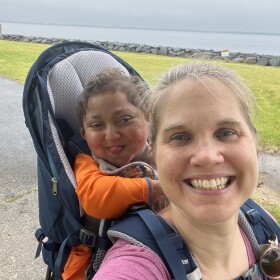
Your Child's Brain
Released the first Thursday of the month
Each month Your Child’s Brain will bring together experts in child brain health, including researchers, educators, physicians and therapists as well as families to discuss contemporary topics about child and youth brain health and development.
Your Child's Brain is produced by Kennedy Krieger Institute with assistance from WYPR.
Latest Episodes
-
February is Rare Disease Month, a time to shine a bright light on the work that goes into identifying, treating, and, ultimately, finding the cures for rare diseases. Join Dr. Brad Schlaggar, president and CEO of Kennedy Krieger, as he discusses research around rare disease with Dr. Jacqueline Harris, a pediatric neurologist and an international leader in the study of Kabuki syndrome. Also on the show is Kimberly Maxfield, who shares her perspective as the parent of Noah, a preschooler with Kabuki syndrome.
-
A stroke happens when blood flow to part of the brain is disrupted—either because a blood vessel gets blocked or because it breaks and causes bleeding. Many people think strokes only happen to adults, but children—even newborns—can have strokes too. Unfortunately, awareness is low, and strokes in kids are often misdiagnosed, which can lead to dangerous delays in treatment. Just like in adults, recognizing the signs quickly can make a big difference in recovery and outcomes for kids. Join Dr. Brad Schlaggar, president and CEO of Kennedy Krieger Institute, along with Drs. Ryan Felling, Laura Malone, and Richard Boada, as they talk about what families need to know about strokes in children.
-
Raising a child with a disability is a journey marked by love, resilience, and hope — but it also brings complex challenges that can feel overwhelming. Parents are navigating unfamiliar systems, advocating fiercely for services, and making critical decisions — all without a roadmap. We are pleased to provide families with a new resource and roadmap. Join Dr. Brad Schlaggar, president and CEO of Kennedy Krieger Institute and his guests Dr. Mary Leppert and Maureen van Stone, as they discuss the Maryland Guide for Families of Children with Disabilities.
-
Early childhood is an important stage of life for brain development. As a child learns new information, engages in social interaction, and goes through their daily routine, their brain responds with neuroplasticity, a process that allows it to change, adapt, and reorganize. Listen to Dr. Brad Schlaggar, president and CEO of Kennedy Krieger Institute and his guests, Drs. Joanna Burton and Gwendolyn Gerner, as they discuss neuroplasticity in early childhood and its role in brain development and learning.
-
Building Brains Through Connection: How Social Interaction Shapes Emotional Intelligence in ChildrenFor children, social interaction isn’t just play—it’s brain-building. When children connect, share, and empathize, they are also strengthening the neural pathways that shape emotional intelligence, communication, cooperation, and lifelong learning. Join Brad Schlaggar, president and CEO of Kennedy Krieger Institute and his guests Drs. Maya Opendak and Tomomi Karigo as they discuss the development of our brains’ neural systems for social and emotional behavior, and the factors that can interrupt that development.
-
Parenting is one of the most important jobs—but most parents don’t get formal training. Many rely on what they learned growing up and figure things out along the way. While that works for some, others may struggle—especially when faced with challenging behaviors or uncertainty about how to support their child. Join Dr. Brad Schlaggar, president and CEO of Kennedy Krieger, along with Dr. Debbie Gross and Amie Bettencourt, as they explore the Chicago Parent Program—a proven, innovative approach that helps parents build skills and support their children’s mental health and well-being.
-
As students get ready to go back to school soon, Kennedy Krieger President and CEO Dr. Brad Schlaggar and his guest, Dr. Nancy Grasmick, former superintendent of schools for the state of Maryland, discuss educating students with neurodevelopmental concerns, the importance of training teachers to meet the needs of those students and what can be done to improve the educational outcomes of all students.
-
In this month’s episode of Your Child’s Brain Dr. Brad Schlaggar, President and CEO of Kennedy Krieger Institute, is joined by Jim Schmutz and Abby DiGilio from Special Olympics Maryland to discuss the power of sports and how participation in sports enables individuals with developmental disabilities to shatter stereotypes and succeed, not only on the playing field, but also in life.
-
What do we know about the health benefits of exercise and other physical activity for children? We know it builds strong muscles and bones, helps keep children at a healthy weight, and can contribute to better sleep. But wait—can regular exercise boost a child’s brain power? Find out when Dr. Brad Schlaggar, president and CEO of Kennedy Krieger, and his guest Dr. Autumn Ivy discuss the fascinating connection between physical activity and brain development in children.
-
We are in the midst of an unprecedented mental health crisis in this country that has especially impacted children. According to experts, an estimated one in five youth has an undiagnosed mental, emotional or behavioral disorder—yet many do not get the help they need. May is known as Children’s Mental Health Awareness Month and in this month’s episode of Your Child’s Brain, Dr. Brad Schlaggar is joined by Dr. Ernestine Briggs-King to discuss the impact that traumatic stress can have on a child’s social and cognitive development, academic performance and overall well-being.











